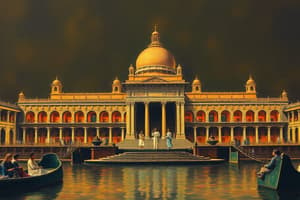Podcast
Questions and Answers
Which House of the Indian Parliament has members who are directly elected by the people?
Which House of the Indian Parliament has members who are directly elected by the people?
- Lok Sabha (correct)
- Rajya Sabha
- Both Lok Sabha and Rajya Sabha
- Neither Lok Sabha nor Rajya Sabha
What is the term of the Lok Sabha members?
What is the term of the Lok Sabha members?
- 5 years (correct)
- 7 years
- 4 years
- 6 years
How are Rajya Sabha members elected?
How are Rajya Sabha members elected?
- Indirectly by the elected members of state and UT legislatures (correct)
- Directly by the people
- By the President of India
- By the Prime Minister of India
What is the eligibility criteria for candidates to contest in Lok Sabha elections?
What is the eligibility criteria for candidates to contest in Lok Sabha elections?
What is the voting system used in Lok Sabha elections?
What is the voting system used in Lok Sabha elections?
What is the purpose of the Question Hour in the Lok Sabha?
What is the purpose of the Question Hour in the Lok Sabha?
What is the role of the Members of Parliament in the legislative process?
What is the role of the Members of Parliament in the legislative process?
What is the role of the Members of Parliament in overseeing the government?
What is the role of the Members of Parliament in overseeing the government?
Flashcards are hidden until you start studying
Study Notes
Lok Sabha Vs Rajya Sabha
- Lok Sabha: The Lower House of the Indian Parliament, composed of 543 elected members (MPs) representing constituencies across the country.
- Rajya Sabha: The Upper House of the Indian Parliament, comprising 245 members (MPs) elected by the elected members of state and UT legislatures.
- Key differences:
- Lok Sabha members are directly elected by the people, whereas Rajya Sabha members are indirectly elected.
- Lok Sabha has a fixed term of 5 years, whereas Rajya Sabha members have a 6-year term, with one-third of the members retiring every 2 years.
Election Process
- Election cycle: Lok Sabha elections are held every 5 years, unless the House is dissolved earlier.
- Eligibility: Candidates must be Indian citizens, at least 25 years old, and meet certain residential and educational qualifications.
- Voting system: First-past-the-post system, where the candidate with the most votes in a constituency wins the seat.
- Election authorities: Conducted by the Election Commission of India, an independent body responsible for ensuring free and fair elections.
Parliamentary Procedures
- Sessions: The Lok Sabha holds three sessions: Budget, Monsoon, and Winter.
- Question Hour: Members can ask questions to the government, which must respond.
- Zero Hour: Members can raise matters of urgent public importance.
- Debates and discussions: Members participate in debates on bills, motions, and other issues.
- Voting: Members vote on bills, motions, and other matters.
Members' Roles
- Lawmaking: Members introduce and debate bills, which become laws after approval.
- Oversight: Members scrutinize the government's actions and policies.
- Representation: Members represent their constituents' interests and concerns.
- Committees: Members participate in various committees, such as the Public Accounts Committee and the Estimates Committee.
Legislative Powers
- Lawmaking: The Lok Sabha has the power to introduce, amend, and pass bills, which then go to the Rajya Sabha for approval.
- Budget and finance: The Lok Sabha approves the Union Budget and exercises control over the government's finances.
- Amendments: The Lok Sabha can amend the Constitution, subject to certain conditions.
- Control over the government: The Lok Sabha has the power to hold the government accountable through questions, debates, and motions.
Lok Sabha Vs Rajya Sabha
- Lok Sabha is the Lower House of the Indian Parliament, composed of 543 elected members (MPs) representing constituencies across the country.
- Rajya Sabha is the Upper House of the Indian Parliament, comprising 245 members (MPs) elected by the elected members of state and UT legislatures.
Key Differences
- Lok Sabha members are directly elected by the people, whereas Rajya Sabha members are indirectly elected.
- Lok Sabha has a fixed term of 5 years, whereas Rajya Sabha members have a 6-year term, with one-third of the members retiring every 2 years.
Election Process
- Lok Sabha elections are held every 5 years, unless the House is dissolved earlier.
- Candidates must be Indian citizens, at least 25 years old, and meet certain residential and educational qualifications.
- The election system is a first-past-the-post system, where the candidate with the most votes in a constituency wins the seat.
- Elections are conducted by the Election Commission of India, an independent body responsible for ensuring free and fair elections.
Parliamentary Procedures
- The Lok Sabha holds three sessions: Budget, Monsoon, and Winter.
- During Question Hour, members can ask questions to the government, which must respond.
- In Zero Hour, members can raise matters of urgent public importance.
- Members participate in debates on bills, motions, and other issues.
- Members vote on bills, motions, and other matters.
Members' Roles
- Members introduce and debate bills, which become laws after approval.
- Members scrutinize the government's actions and policies.
- Members represent their constituents' interests and concerns.
- Members participate in various committees, such as the Public Accounts Committee and the Estimates Committee.
Legislative Powers
- The Lok Sabha has the power to introduce, amend, and pass bills, which then go to the Rajya Sabha for approval.
- The Lok Sabha approves the Union Budget and exercises control over the government's finances.
- The Lok Sabha can amend the Constitution, subject to certain conditions.
- The Lok Sabha has the power to hold the government accountable through questions, debates, and motions.
Studying That Suits You
Use AI to generate personalized quizzes and flashcards to suit your learning preferences.




